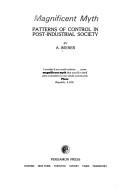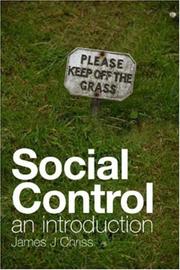| Listing 1 - 10 of 2583 | << page >> |
Sort by
|
Book
ISBN: 1412350654 Year: 2006 Publisher: Chicoutimi : J.-M. Tremblay,
Abstract | Keywords | Export | Availability | Bookmark
 Loading...
Loading...Choose an application
- Reference Manager
- EndNote
- RefWorks (Direct export to RefWorks)
The paper deals with the following question. To what extent do the human efforts at controlling crime succeed ? It starts by proposing an enlarged concept of social control. In the second part, a theory of choices made by offenders under the constraint of social control is put forward. In the last part, it is argued that social control can have four types of impacts : I - reducing the frequency of crime ; 2 - reducing its severity ; 3 -rendering obsolete some criminal tactics and stimulating the development of new ones ; and, 4 - channeling offenders toward vulnerable targets. It is concluded that crime is shaped by the means used to control it, meaning that a given state of crime rates should be seen as the result of what people decide to do and not to do about crime.
Book
Year: 2015 Publisher: Bosnia : Sarajevo Open Centre,
Abstract | Keywords | Export | Availability | Bookmark
 Loading...
Loading...Choose an application
- Reference Manager
- EndNote
- RefWorks (Direct export to RefWorks)
Publikacija koja je pred vama nastala je na osnovu druženja, učenja i saradnje Sarajevskog otvorenog centra sa transeksualnim i transrodnim osobama, budući da su se kroz intenzivan rad sama od sebe nametnula pitanja i problemi koji se tiču njihovog svakodnevnog života, tj. zdravstvenog, pravnog, društvenog i svakog drugog položaja u BiH. Posljednjih godina sve više transrodnih i transeksualnih osoba javlja nam se za razgovor, savjet ili pomoć. Uzajamnim radom sa neformalnom grupom Trans* BiH obilježili smo i javno se oglasili povodom svih važnih datuma za transrodne osobe. Također smo zajedno organizovali i regionalnu radionicu osnaživanja trans* osoba iz BiH i regiona, nakon čega je u junu 2015. godine uslijedila i prva regionalna konferencija u BiH „Dijalog o transrodnosti“ koja je okupila trans* osobe i stručnjake i stručnjakinje koje se bave ovom tematikom, a koje dolaze iz zdravstvenog, pravnog i civilnog sektora.
Book
ISBN: 0837146402 9780837146409 Year: 1970 Publisher: Westport, Conn.: Greenwood,
Abstract | Keywords | Export | Availability | Bookmark
 Loading...
Loading...Choose an application
- Reference Manager
- EndNote
- RefWorks (Direct export to RefWorks)
Book
ISBN: 9781509539505 9781509539499 1509539506 1509539492 Year: 2022 Publisher: Cambridge: Polity press,
Abstract | Keywords | Export | Availability | Bookmark
 Loading...
Loading...Choose an application
- Reference Manager
- EndNote
- RefWorks (Direct export to RefWorks)

ISBN: 0080214746 0080231004 Year: 1978 Publisher: Oxford, Eng. ; New York : Pergamon Press,
Abstract | Keywords | Export | Availability | Bookmark
 Loading...
Loading...Choose an application
- Reference Manager
- EndNote
- RefWorks (Direct export to RefWorks)
Book
ISBN: 2348068869 Year: 2021 Publisher: Paris (9bis, rue Abel Hovelacque 75013) : La Découverte,
Abstract | Keywords | Export | Availability | Bookmark
 Loading...
Loading...Choose an application
- Reference Manager
- EndNote
- RefWorks (Direct export to RefWorks)
« Je n'existais plus. » Cette phrase, Pascale Jamoulle l'a entendue à de multiples reprises lors de l'enquête de terrain qu'elle a menée, pendant sept ans, pour mieux cerner et comprendre ce fait social contemporain qu'est l'emprise. Prononcés par des personnes qui se sont longtemps tues, ces mots en résument les effets d'anéantissement et de dépersonnalisation. Auparavant libres de penser et d'exister par elles-mêmes, elles sont devenues dépendantes d'un prédateur ou d'un système prédateur, charismatique. En les piégeant, celui-ci s'est approprié graduellement différentes dimensions (physiques, mentales, socioéconomiques, symboliques...) de leur existence. Cet ouvrage explore et cherche à élucider les systèmes d'emprise, les passages d'une emprise à une autre, ainsi que les dynamiques d'émancipation qui permettent de s'en libérer. Il croise les lieux d'investigation (le couple, la famille, le soin, le travail, l'économie souterraine) et les récits de personnes touchées. Il pose en particulier cette question anthropologique : les systèmes d'emprise ont-ils la même structure, d'un terrain à l'autre?? Les processus lents et progressifs de la déprise sont-ils similaires??
Book
ISBN: 3110813335 Year: 2019 Publisher: Berlin ; Boston : De Gruyter Mouton,
Abstract | Keywords | Export | Availability | Bookmark
 Loading...
Loading...Choose an application
- Reference Manager
- EndNote
- RefWorks (Direct export to RefWorks)
Book
ISBN: 159332569X 9781593325695 9781593323783 1593323786 Year: 2009 Publisher: El Paso LFB Scholarly Pub. LLC
Abstract | Keywords | Export | Availability | Bookmark
 Loading...
Loading...Choose an application
- Reference Manager
- EndNote
- RefWorks (Direct export to RefWorks)
Kuhn focuses on the assumptions that theories of social control make about human nature and examines a number of social and developmental theories that have emerged since Hobbes, whose social contract theory, along with Freud's psychoanalytic theory, so often provide the foundation for theories of social control. Kuhn then incorporates the pragmatic and symbolic interactionist theories she has examined into an alternative theoretical model of Social Identity and Social Control that reorients our view of human nature and outlines a dynamic new approach to understanding criminal behavior.

ISBN: 0745638570 0745638589 9780745638577 9780745638584 Year: 2007 Publisher: Cambridge Polity press
Abstract | Keywords | Export | Availability | Bookmark
 Loading...
Loading...Choose an application
- Reference Manager
- EndNote
- RefWorks (Direct export to RefWorks)
Book
ISBN: 9780230594449 Year: 2010 Publisher: Basingstoke Palgrave Macmillan
Abstract | Keywords | Export | Availability | Bookmark
 Loading...
Loading...Choose an application
- Reference Manager
- EndNote
- RefWorks (Direct export to RefWorks)
| Listing 1 - 10 of 2583 | << page >> |
Sort by
|

 Search
Search Feedback
Feedback About UniCat
About UniCat  Help
Help News
News